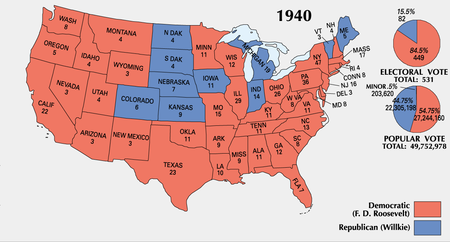U.S. presidential election, 1940
|
|
The U.S. presidential election of 1940 was fought in the shadow of World War II, which had started the previous September. The continuing crisis in Europe made voters desire a strong and experienced president, so incumbent President Franklin D. Roosevelt broke with tradition and ran for a third term as president. This, in turn, would lead to the passage of the 22nd Amendment, limiting presidents to two terms.
| Contents |
Nominations
Democratic Party nomination
Roosevelt dithered about whether to run for a third term, but there was strong Democratic support for it and he chose to accept the nomination.
At the national convention, he decided against allowing Vice President John Nance Garner to be renominated as his running mate and instead chose Henry A. Wallace, his Secretary of Agriculture, to be the vice-presidential nominee. Wallace, a former Bull Moose Republican, was strenuously opposed by many at the convention, particularly the more conservative Southern Democrats, but Roosevelt threatened to withdraw from the ticket if Wallace was rejected, and opposition quickly faded.
Republican Party nomination
Going into the 1940 Republican National Convention, held in Philadelphia, Pennsylvania, the three "main" candidates for the nomination were considered to be Senators Robert Taft of Ohio and Arthur Vandenberg of Michigan and Thomas E. Dewey, the "gangbusting" District Attorney from Manhattan. All three men had campaigned vigorously during the primary season, but only 300 of the 1,000 convention delegates had been pledged to a candidate by the time the convention opened. This left an opening for a dark horse candidate to emerge during the proceedings.
That was exactly what happened when, at the convention, a Wall Street-based industrialist named Wendell Willkie, who had never before run for public office, emerged as the nominee. Willkie, a former Democrat who had been a Roosevelt delegate at the 1932 Democratic National Convention, had been considered an unlikely choice when he had begun his campaign only a few months before, and his meager showings in various Gallup polls seemed to bear this view out.
As the convention began, however, Willkie quickly emerged as an estimable force. Hundreds of thousands, perhaps as many as one million, telegrams urging support for Willkie arrived in Philadelphia, many of them from "Willkie Clubs" that had sprung up across the country. At the convention itself, keynote speaker Governor Harold Stassen of Minnesota, a popular figure in the party who, many felt, would have been a strong compromise candidate had he been old enough, came out publicly for Willkie and became his official floor manager. As the convention continued, hundreds of Willkie supporters packed the upper galleries of the convention hall. As the Dewey and Taft delegates quickly deadlocked and the delegates belonging to "favorite son" candidates were released, these supporters' loud cries of "We want Willkie" began to swing the balloting in Willkie's favor. Finally, on the sixth ballot, he received the needed majority of delegates and won the nomination.
Having given little thought to who he would select as his vice-presidential nominee, Willkie left the decision up to convention chairman Joe Martin, who suggested Senate Minority Leader Charles L. McNary of Oregon. Despite the fact that McNary had spearheaded a "Stop Willkie" campaign late in the balloting, the candidate picked him to be his running mate and McNary was nominated by acclamation.
General election
Campaign
Willkie campaigned against the New Deal and the government's lack of military preparedness. During the election, Roosevelt preempted the military issue by expanding military contracts. Willkie then reversed his approach and accused Roosevelt of warmongering. On election day Roosevelt received 27 million votes to Willkie's 22 million, and in the Electoral College, Roosevelt defeated Willkie 449 to 82.
The election was held on November 5, 1940.
Results
Template:Start U.S. presidential ticket box Template:U.S. presidential ticket box row Template:U.S. presidential ticket box row Template:U.S. presidential ticket box row Template:End U.S. presidential ticket box (a) Template:U.S. popular vote total disclaimer
Source: U.S. Office of the Federal Register (http://www.archives.gov/federal_register/electoral_college/scores.html#1940)

